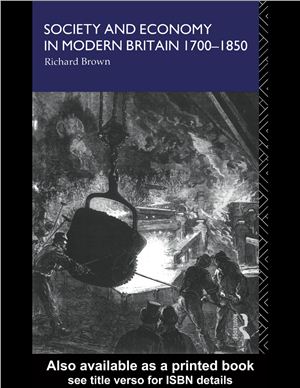Routledge, 1991. - 496 p.
Both contemporaries and later historians viewed the Industrial Revolution as a `tuing point' in mode British history. No doubt a change occurred, but what was the nature of that change and how did it affect rural and urban society?
In this, the first part of his two-volume history of nineteenth-century Britain, Richard Brown examines the economic and social aspects of the Industrial Revolution in the larger context of British history. Treating developments in Wales, Scotland, and Ireland, as well as those in England, Society and Economy in Mode Britain 1700-1850 is distinguished by its emphasis on the diversity of experience - the continuity as well as change - in this crucial period of development.
Ideal textbooks for the study of British nineteenth-century history, both Society and Economy in Mode Britain and Church and State in Mode Britain are written in a lively and accessible style. Taken as a pair, they provide a comprehensive look at the social ramifications of technological change.
Both contemporaries and later historians viewed the Industrial Revolution as a `tuing point' in mode British history. No doubt a change occurred, but what was the nature of that change and how did it affect rural and urban society?
In this, the first part of his two-volume history of nineteenth-century Britain, Richard Brown examines the economic and social aspects of the Industrial Revolution in the larger context of British history. Treating developments in Wales, Scotland, and Ireland, as well as those in England, Society and Economy in Mode Britain 1700-1850 is distinguished by its emphasis on the diversity of experience - the continuity as well as change - in this crucial period of development.
Ideal textbooks for the study of British nineteenth-century history, both Society and Economy in Mode Britain and Church and State in Mode Britain are written in a lively and accessible style. Taken as a pair, they provide a comprehensive look at the social ramifications of technological change.

